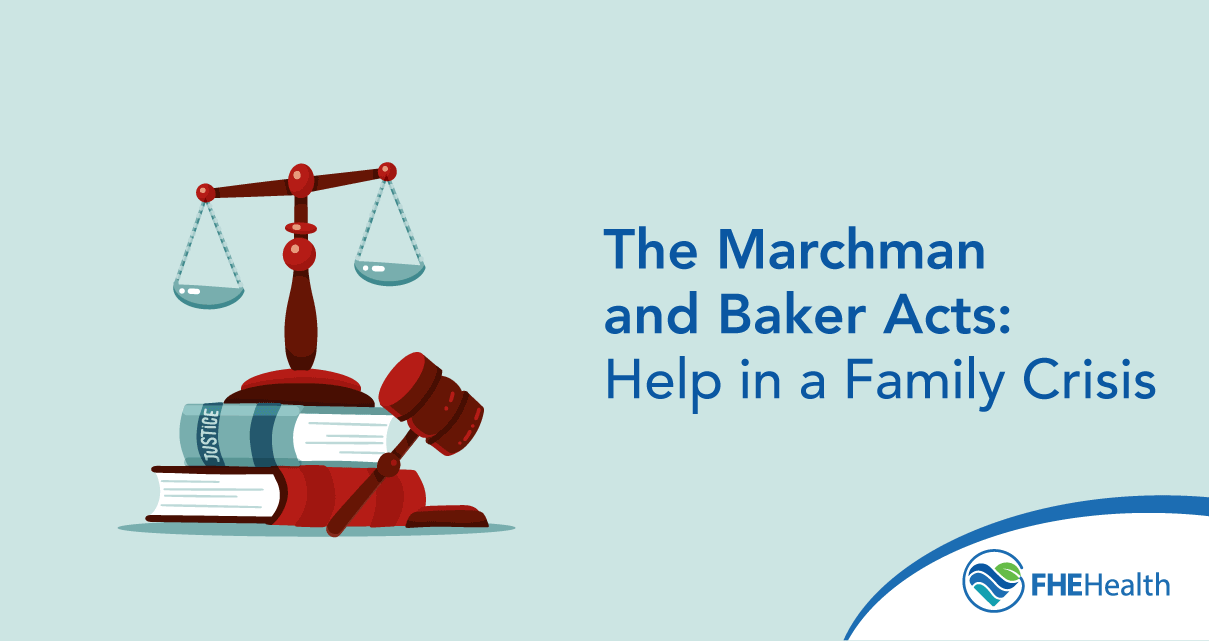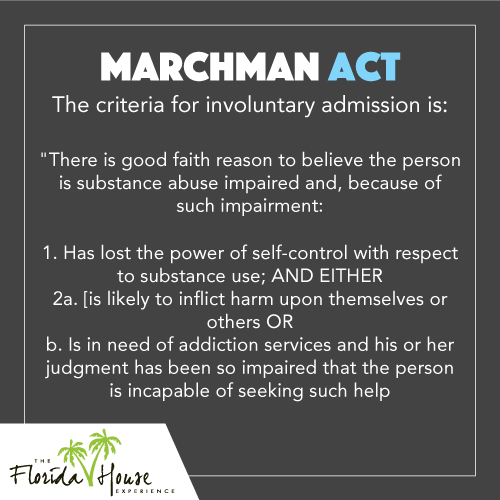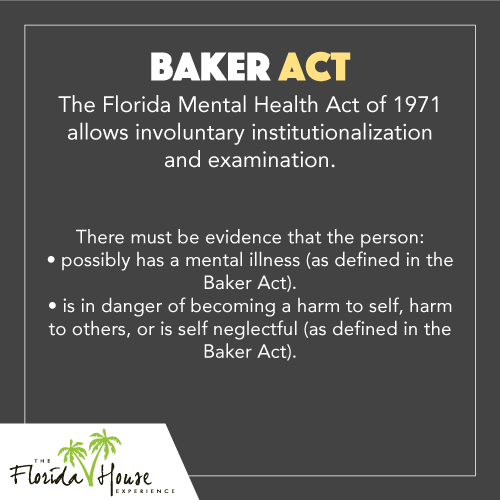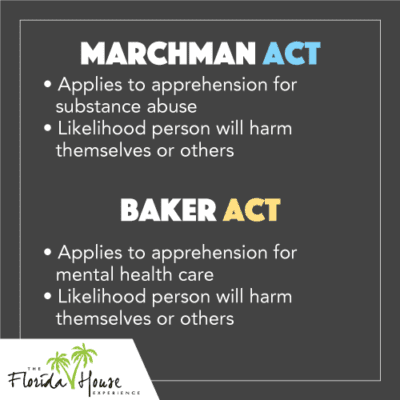
It’s easy to feel helpless when you have a loved one struggling with addiction. Despite your support, they may be refusing to enter treatment or be unable to access vital resources. You may feel your efforts have been futile and there’s nothing more you can do to help them.
However, that doesn’t have to be the case. In Florida, there are laws that can provide the necessary tools to help someone get the treatment they need, even involuntary rehab. Learn the differences between the Marchman Act vs. the Baker Act and how to take advantage of these laws to support your loved one.
Who May Be Able to Get Help?
In some situations, it may be necessary to force a person to get the help they need through substance abuse treatment. Before this occurs, however, you’ll want to try an intervention to confront them about their behavior.
Even after countless opportunities, some people will continue to deny the need for treatment. But there are more options to explore. State laws can force an individual to be examined by a professional to determine if they meet the requirements for court-ordered treatment through involuntary rehab.
Marchman Act vs. Baker Act
What are the Marchman Act and Baker Act about? These laws provide a basic level of support for at-risk individuals — the Baker Act for mental illness and the Marchman Act for substance abuse. For the laws to apply, however, an individual must meet specific criteria. Take a closer look at who may qualify under both laws.
Criteria for the Baker Act
To qualify for the Baker Act, a person must:
- Be unable to determine if they need an examination or have refused an examination AND
- Be at high risk for harming themselves, either through refusing to care for themselves or through self-neglect, with no way to avoid this with the help of family members OR
- Be at high risk of causing harm to other people or themselves in the near future
Criteria for the Marchman Act
To qualify for the Marchman Act, a person must:
- Be a risk to other people or likely to commit self-harm
- Not be able to make rational decisions about the care they need
In both cases, the law provides assistance to families through the court system to require the individual to obtain help. This is a court-ordered action and will likely be monitored by the courts over the period of care. This order may include care to help stabilize the individual’s health or support through detox. In some situations, it can also apply to long-term treatment for substance abuse or mental health needs.
History of the Baker Act
Although it may seem difficult to seek involuntary mental health help for a loved one who needs it, it was previously too easy. The Baker Act, which became law in Florida in 1971, was championed by Maxine Baker at a time when laws regarding involuntary commitment hadn’t changed in nearly a century.
Prior to the Baker Act, any person could be involuntarily committed based on only three witness affidavits and a ruling by a judge. There were no mental health professionals providing input and no mandatory review periods or any forms of legal due process. Before the Baker Act, people could end up locked away in mental hospitals indefinitely simply based on hearsay.
Similar State Laws
Once the Baker Act became law in Florida, other states followed suit and enacted similar laws, each with its own distinct name and parameters, such as:
- Lanterman-Petris-Short (LPS) Act (California)
- Alabama Mental Health Code
- Arizona Revised Statutes, Title 36, Chapter 5
While many states, such as those listed above, don’t count substance abuse disorder as a mental illness that can be treated involuntarily, other states do, including Florida, Alaska, Delaware and Michigan.
Who Can Seek Out Care for Their Loved One?

Only specific people can request court-ordered treatment. Generally, there must be significant evidence that the individual needs help. In most cases, a recommendation from a doctor is required. However, the examination by the doctor can be involuntary if the person refuses to be examined. The following professionals are able to file a request for involuntary treatment with the court after the initial examination.
Who can file for the Baker Act:
- Doctors
- Psychiatric nurses
- Mental health counselors
- Clinical social workers
- Psychologists
- Therapists specializing in marital or family support
Under this law, the care provider must first conduct a full examination of the individual before they make a decision. The decision must be made within 48 hours of examination. However, family members can petition the court for an involuntary examination.
Who can file for the Marchman Act:
- Licensed physicians
- Law enforcement officers
The difference between the Baker Act and the Marchman Act is primarily in their requirements. Under the Marchman Act, a law enforcement officer or doctor can require a person to enter treatment immediately, even when there’s no court order to do so.
Doctors must have provided an assessment within the previous 5 days to make this decision. Law officers don’t have to witness intent to harm or observe any action; rather, they can receive information from a third party, gather evidence, and then take a person into custody with the goal of transporting them to a crisis center.
Family Member Filing
It’s possible for a family member, such as a blood relative or spouse, to request an involuntary examination to determine if involuntary treatment is justified. It’s also possible for any other three people — not related to the individual but with specific knowledge of the substance abuse — to take action. This allows people who may not have any family to still benefit under this law.
Family members may find this limiting, but it doesn’t have to be. If you want to ensure your loved one obtains the help they need, you can file a petition yourself or speak to a law officer to request help in filing under either of the acts.
What Do You Need to Do to Take Action?

When taking action with the Marchman Act vs. Baker Act, the steps are essentially the same. If you have a healthcare professional or law enforcement officer who can support your efforts, such as one who witnessed a crisis, your first step should be reaching out to them. You can still take action on your own, but it may be more complicated. You may wish to work with an attorney (though it’s not a requirement).
A family member must fill out a Petition for Involuntary Assessment and Stabilization at the local court office to request the initial involuntary examination required by these laws. More information and access to these forms can be found at the Florida Department of Children and Families. The local court office can also help.
Timelines for Action
Once the petition is filed, a hearing is held at the court. After that, the individual can be brought into custody involuntarily for a full medical stabilization and assessment. At this initial examination, they may be held for up to 72 hours. Upon completion of the involuntary examination, the individual must be released if no intervention is recommended.
If the professional doing the examination determines there should be some sort of treatment and the individual agrees to voluntarily complete it, the person can be released with a referral for outpatient care or continue with inpatient treatment.
If the individual doesn’t agree to voluntary treatment as recommended, a second hearing is held. If the judge grants an involuntary placement, it may include a 60-day treatment with as much as a 90-day extension. However, it’s important to note that if a person doesn’t want to stay in treatment, once they no longer meet the criteria of the given act, they must be released.
What makes these laws important and unique is that they have consequences for those who don’t pursue the help they need. If the individual leaves treatment during the court-ordered stay, they can be held in contempt of court. Additionally, the court can require the individual to go back to treatment at that time. If they leave again or fail to return, jail time is an option.
Should You Take This Step?
Many people are reluctant to take these measures and prefer to avoid involving the courts. However, some people with substance abuse disorder or mental illness are unable to make these decisions for themselves, even after an intervention. This is when it becomes necessary to seek out care from professionals.
Our team at FHE Health works closely with you to guide you through the difficult but rewarding journey to recovery. If you feel your loved one is in danger, contact us today for immediate help.







